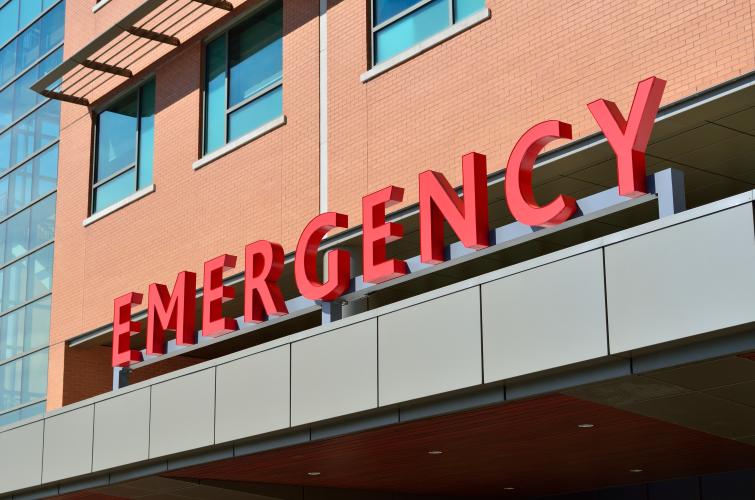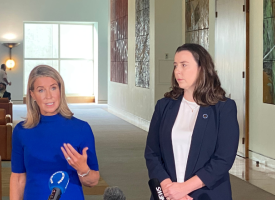AMA Tasmania's five election priorities to improve health care
Our health system is in perpetual crisis, so much so it has become the norm to read about ambulance ramping, general practice closing and difficulty in recruiting hospital staff.

AMA Tasmania today launched its top five priorities for this State Election: Backing General Practice; Relieving pressure on our hospitals; Building critical infrastructure; Community support; and ensuring a fair complaints process.
President of AMA Tasmania, Dr John Saul said improving our health system requires more support of our medical workforce across the primary and acute sectors, building space for more beds through new critical infrastructure and investing in public health programs.
“It might surprise you to see our top priority is backing general practice. As a GP, I know how critical it is to have a strong primary health service to keep people out of hospitals and yet fewer doctors are becoming GPs making it harder to see a GP when you need to.
“I also know that this is traditionally an area for the federal government, not state. However, it is in the interests of the state to ensure a strong general practice workforce, particularly in rural areas where these doctors provide the care in the state-run local hospitals.
“That’s why we want the state government to work with all stakeholders and the federal government to develop a General Practice Work Force Plan for Tasmania; look at how’s its own investment in the rural GP workforce can help make it more attractive for general practice; and support collaborative prescribing with pharmacy.
“It’s also why it is critical both major political parties rule out imposing payroll tax on general practice. A new tax on general practice will only see the cost of seeing a doctor go up more creating a false economy for the government. With higher GP costs, more people will go to their hospital for ‘free care’.”
Dr Saul said the next step is to strengthen acute care by addressing the log jam in our emergency departments.
“There is no one solution to the issue of bed block in our hospitals. We need investment in a multitude of ways to eliminate the problem that sees ambulances ramped and patients stuck for hours and sometimes days on a bed within the busy, noisy, bright environment of the ED.
“Basically, we need more beds! Beds on wards, beds in homes supported virtually and beds in medi-hotel type facilities for those not requiring an acute bed, but not able to go home immediately. Which is why our third priority is putting dollars into the many master plans to grow beds.
“While masterplans are important, visions don’t solve problems. We need the new Mental Health inpatient facility built at St John’s Park to free up a floor of K Block at the Royal Hobart Hospital (RHH) for medical beds.
“We need the new sub-acute facility built at St John’s Park to move sub-acute patients out of acute care beds.
“We need the projects completed now, not in the far-off future. Hence our request these master plans build in a timeframe that sees them come to fruition by 2035.”
Dr Saul said we also need more pathologists and radiographers at the RHH and across the state to ensure access to timely diagnostic services.
“Right now, we have Tasmanians unnecessarily experiencing delay in receiving cancer treatment because they can’t get a scan through radiology due to insufficient radiographers and then can’t get a diagnosis from a tissue sample because of the lack of pathologists.
“More investment is required now to give Tasmanians with cancer the best chance of survival.”
Tobacco companies are always looking to recruit new users of tobacco products, with the latest to try to beat tighter regulations around vaping, being nicotine pouches.
Dr Saul said we must keep ahead of the tobacco game.
“Far too many young people have been sucked into the addictive world of vaping and now we fear it will be into nicotine pouches as vapes become harder to obtain. It is imperative the state and federal governments jump on this newest product to stop more people becoming addicted to this harmful drug.
“The government took a backwards step when it removed the ability of tobacco control officers to give out on the spot fines to retailers of tobacco when selling tobacco products to minors and then halved the number of officers available to help police the tobacco sector.
“Tobacco causes harm and creates the cancer patients of tomorrow. We need more action, more education, and more enforcement to limit the availability of tobacco products to our kids.”
Climate change is causing fear among our young people, with many considering whether they will bring children into this uncertain world. AMA Tasmania wants to see vital programs aimed at this cohort expanded to help manage ‘eco-stress’ among young people.
People with ADHD can lead healthy and productive lives if they receive the right treatment and support. Without it we know they have a 29% increase in vehicle accidents, are more likely to have an accidental injury and are twice as likely to commit suicide.
“Our paediatricians are swamped with children with developmental conditions including ADHD. We need to find a better way for GPs to be able to work with paediatricians to support these kids. Right now, there are over three thousand children waiting to see a paediatrician. A shared care model would help.”
Dr Saul said the fifth and last priority comes back to supporting our public sector workforce by ensuring a fair and just complaints system that protects patients, but also ensures where a doctor or other healthcare professional is accused of something, that natural justice is accorded at all times. >>>>ENDS


